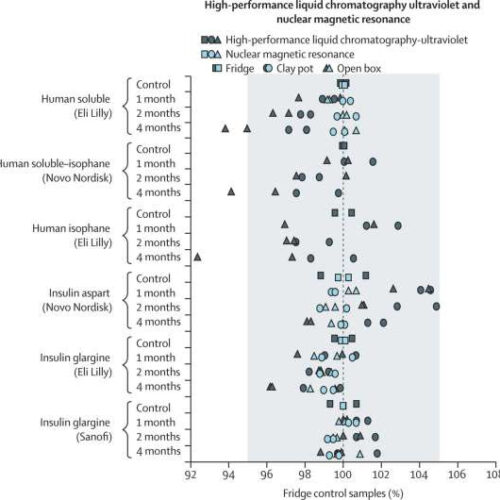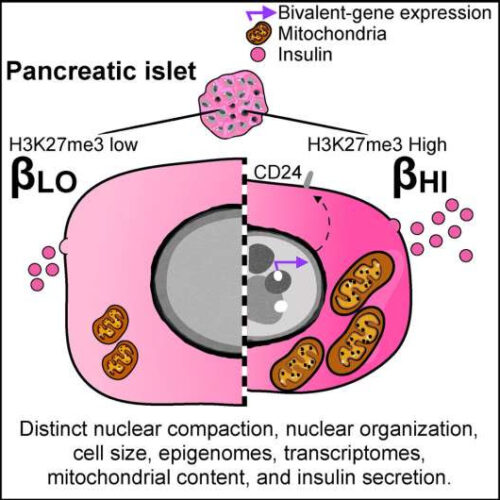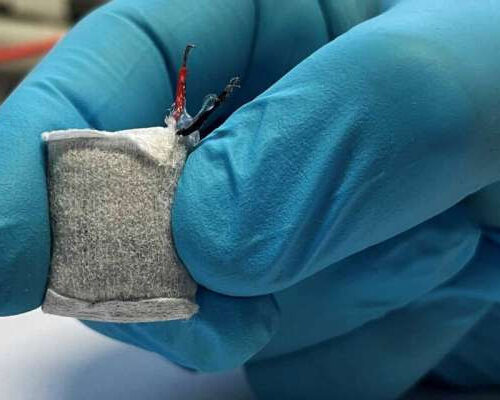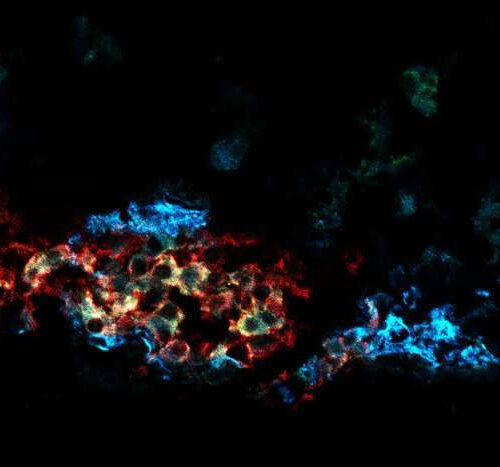by American Physiological Society Credit: Pixabay/CC0 Public Domain Researchers from the University of Vermont have found that eating full-fat yogurt on a daily basis may help lower fasting glucose levels in middle-age and older adults with prediabetes. The research team will present their work this week at the American Physiology Summit, the flagship annual meeting of the...
Category: <span>Diabetes</span>
Longer shelf life for insulin has major bearing on global health
by Swedish Research Council Relative potency and total concentration of insulins at each timepoint Relative potency measured by high-performance liquid chromatography-ultraviolet (shaded in black), and relative concentration measured by nuclear magnetic resonance (shaded in blue), of the control insulins after storage in refrigerator (squares), and insulins stored in clay pots (circles) or boxes (triangles) for 1,...
Fasting diet reduces risk markers of type 2 diabetes, study finds
by University of Adelaide Weight loss (kg) relative to baseline. Presented are means and 95% CIs of the non-fasting weight change by group during each face to face check-in visit. Treatment group trajectories were compared using linear mixed effects regression assuming piecewise linear effects assumed for the interventions over two time periods: month 0–6 and...
Exercise Protects Insulin-Producing Beta Cells
BY JOSEPH GUSTAITIS | MARCH 24, 2023 One of the difficulties of diabetes is that it causes the progressive loss of beta cells in the pancreas. Beta cells create, store, and release insulin, and insulin controls the amount of glucose, or sugar, in the blood. Without enough beta cells, blood sugar can get out of control. Beta cells have been...
A New Approach to Type 2 Diabetes Management in Primary Care
Michael E. Bowen, MD, MPH, MSCS DISCLOSURES March 28, 2023 In the United States, primary care providers (PCPs) manage over 75% of patients with type 2 diabetes (T2D). Thus, PCPs are uniquely positioned to improve the glycemic control and cardiometabolic health of patients with T2D. In recent years, emerging data on the role of sodium-glucose cotransporter 2 (SGLT2) inhibitors and glucagon-like...
Researchers discover two subtypes of insulin-producing cells
by Van Andel Research Institute Graphical abstract. Credit: Cell Metabolism (2023). DOI: 10.1016/j.cmet.2023.03.008 A team led by Van Andel Institute and Max Planck Institute of Immunobiology and Epigenetics scientists has identified two distinct subtypes of insulin-producing beta cells, or ß cells, each with crucial characteristics that may be leveraged to better understand and treat type 1 and type...
Implantable fuel cell that generates electricity from excess glucose in the blood
by Peter Rüegg, ETH Zurich The prototype fuel cell is wrapped in a fleece and is slightly larger than a thumbnail. Credit: Fussenegger Lab / ETH Zurich In type 1 diabetes, the body does not produce insulin. This means that patients have to obtain the hormone externally to regulate their blood sugar levels. Currently, this is...
Get to Know Vitamin B5
BY AMY CAMPBELL, MS, RD, LDN, CDCES | MARCH 15, 2023 Vitamin B5 is part of the B complex vitamin family, which, like its cousins, helps the body convert food into fuel that the body uses for energy. Interested in learning more about vitamin B5? Keep reading! What is vitamin B5? The other name for vitamin B5 is...
New research reveals a potential mechanism for how coffee may reduce the risk of type 2 diabetes
KAIZO New scientific research investigates inflammation and insulin resistance in habitual coffee drinkers to understand how coffee may reduce the risk of type 2 diabetes (T2D), mediated by inflammatory biomarkers in the body 1. Drinking just one additional cup of coffee per day was associated with a 4-6% lower risk of T2D among participants in two large prospective...
Losing a key type of pancreatic cell may contribute to diabetes
by Weill Cornell Medical College A transplanted pseudoislet made from CD63hi beta cells. Credit: Weill Cornell Medicine Multiple types of beta cells produce insulin in the pancreas, helping to balance blood sugar levels. Losing a particularly productive type of beta cell may contribute to the development of diabetes, according to a new study by Weill...







